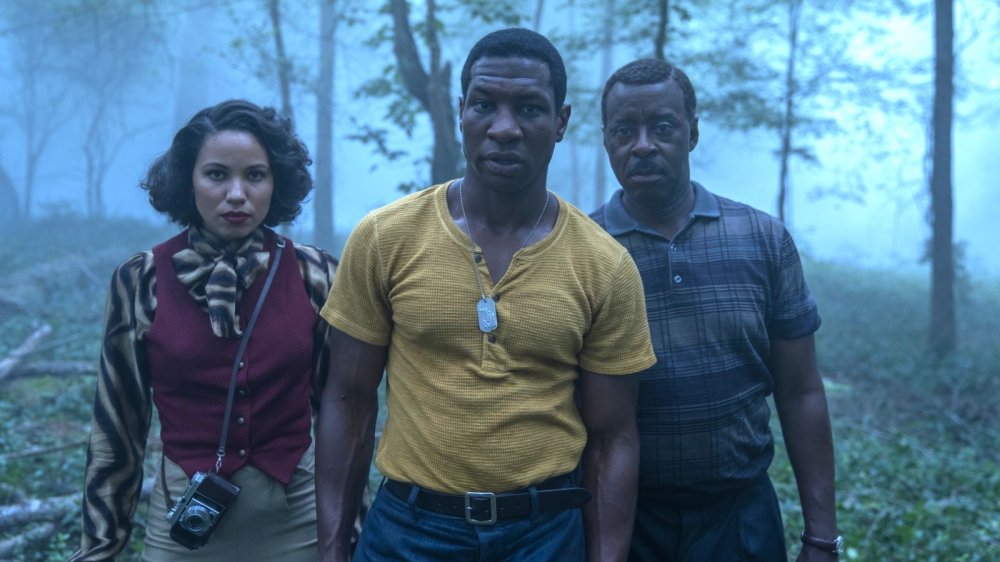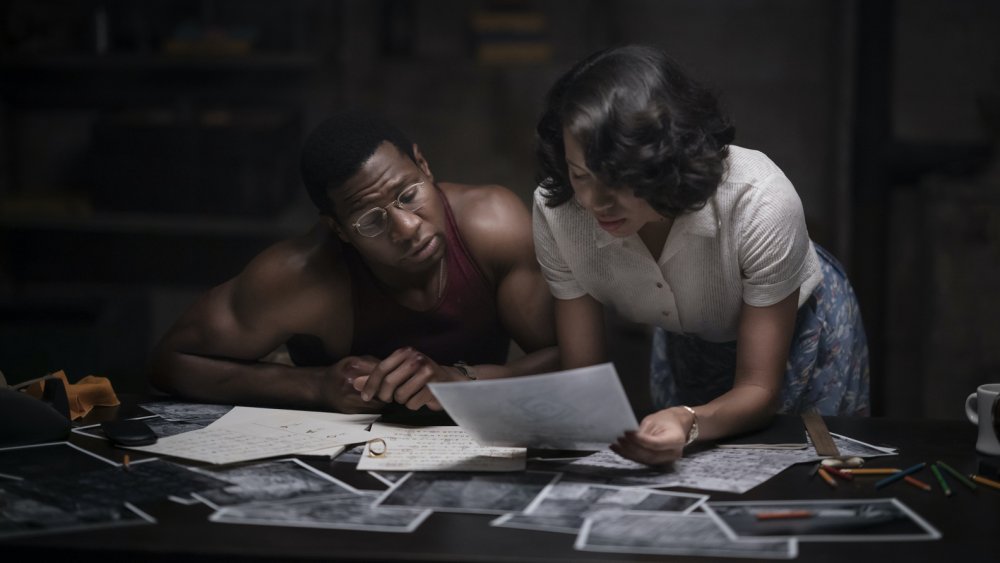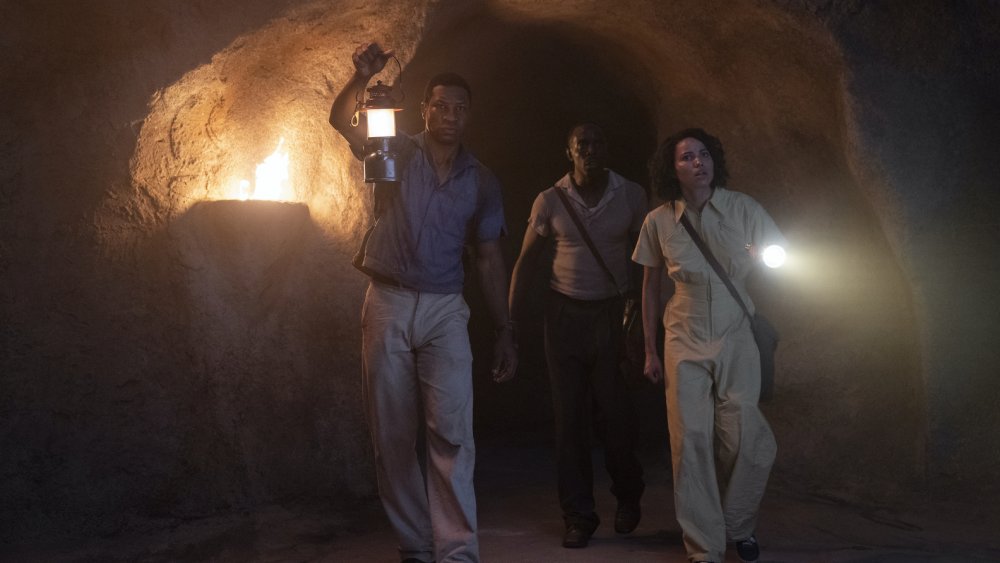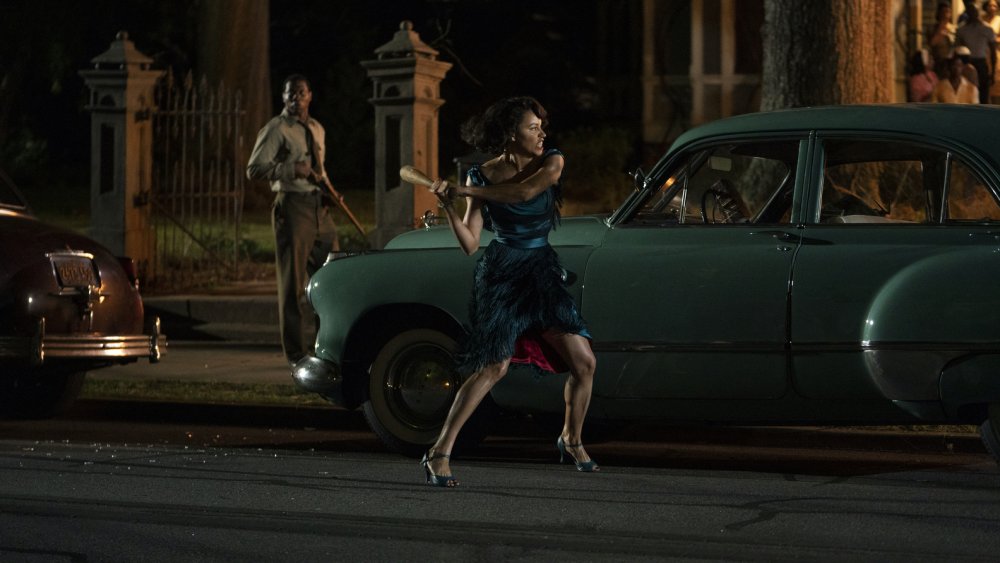Showrunner Misha Green Talks Season 1 Of Lovecraft Country - Interview
It's hard to believe we're already past the halfway point of season one of HBO's Lovecraft Country — and what a wild romp it's been so far. Episode one was a straight-up 1950s drama that took a sharp turn and ended with an unexpected yet delightfully bloody Evil Dead-esque finale. Episode two introduced us to the Order of the Ancient Dawn and injected strong doses of fantasy, magic, and mystery into the plot, while episode three went bonkers with its ghost-infested haunted house theme. If that wasn't already a genre mashup of epic proportions for you, episode four hurdled into full-blown Indiana Jones meets The Goonies adventure mode complete with a cadaver-filled ghost ship, while episode five upped the ante in the occult department with its fascinating and thought-provoking shapeshifter episode.
Who knows what dark and twisted pleasures await us from here, but it's no wonder why fans of the show are on edge and eagerly awaiting each new episode so they may further plummet down the rabbit hole. Lovecraft Country is based on the acclaimed novel by Matt Ruff, and executive produced by Jordan Peele and J.J. Abrams. Holding the mantle of showrunner is writer-producer Misha Green, who has some impressive titles on her own ever-growing resume. Take a glance at her IMDb page, and you'll see that she's served as a showrunner on WGN's Underground and her writing credits include episodes of Sons of Anarchy, Heroes, and Spartacus, to name a few.
Looper participated in a roundtable interview with Green, during which she answered a few hard-hitting questions about the show. Lovecraft Country puts a spotlight on some heavy topics, including racism and other socially relevant issues, and Green discusses everything from why she loves the horror genre so much to her conflicted feelings about legendary author H.P. Lovecraft, and why real life is sometimes like being in a horror movie.
Lovecraft Country is ultimately a show about family secrets
In the podcast Lovecraft County Radio, writer Shannon Houston commented on how she was affected by your description of how horror works in conversation with blackness and queerness. I was wondering if you could expand on that a bit and how that influenced the show?
The idea of being an "other" in this world is you're walking around in a horror movie at all times. You're always on edge. You're wondering when the monster is going to jump out and get you. I feel like that's the experience of queer people in America. That's also the experience of African Americans in America or anybody who's not white. It's even part of the experience as women, white women in America as well. So for me it's not a hard step into a horror movie because I've always lived in a horror movie. So I think that that connection for me is why it's always been my favorite genre. I feel like Shannon, maybe when I explained that to her, it opened the genre up in a different way for her.
When you were adapting Lovecraft Country from the novel, which character arc was the easiest to flesh out and which one was the most complex?
I think that they were all a joy. So that made it easy, because [author] Matt Ruff created such interesting characters on the page that it was just a joy to flesh them out and take them into the TV sphere. What we talked about a lot was this idea that the show, at the end of the day, is just a family drama. What is it about these people in this family and what secrets and shame do they have to unpack and exercise to come together and reclaim their legacy? We talked a lot about all those layers and all that mystery and unpacking that because no one is ever what they seem right when you meet them. We wanted that over the course of the ten episodes and we didn't want to let anybody off the hook. I think it's a little easy to do that nowadays. In the 1950s, you're grappling with a different world view than you have now. We wanted to show that parallel and understand that maybe we don't have that open view that we think we have now.
Misha Green told her writers 'It's going to be icky'
Each character is really sort of exploring a different facet of their own respective traumas. As you were crafting this story, aside from the concept of trauma itself, what was something, beyond monsters and magic, that was really important for you as a storyteller to really define this series?
Well, what if it was just monsters and magic? For me, I think the kind of a theme I'm always circling around in my head, which is why I love the horror genre, is what are we willing to do for metaphorical and physical survival? I think that is an exploration for every character. How far are you willing to go to stake your claim in your legacy and who you are as a person and say, "I'm worthy to be here"? I think that's something I see people struggling with a lot — I struggle with it a lot. It's just how do you make sure that you stand your ground and you find your place in the world. Even if that place is not the place everyone else tells you it's supposed to be. So for me, TV is character. That's what I want to watch, I want to watch people. Horror, when it works for me, I'm there with the character and I'm just feeling as nervous as they are. So I think that was really important in the writer's room. I said to every writer, "Get prepared for therapy." I was like, "It's going to be icky. We're going to feel icky. We're going to be like, 'Ooh, we don't want to go there.'" But I feel like it's important too, because that's when you're sharing something saying that we're not alone. We're all crazy in our own little heads and that doesn't mean we don't get to stand and be counted.
How much of a deep dive did you do into the works of H.P. Lovecraft when it came to not just the tone of the show, but also the look? I felt like in that first episode, the creatures had a very Lovecraftian art look. You also pay a lot of homage to other horror films that have a Lovecraftian influence. For example, The Evil Dead. I felt like that first episode had that with the look of the cabin down to the placement of that deer head. It looks like you guys were paying homage to other horror films as well. Did you compile a list of other horror movies you wanted to give a shout out to as well as H.P. Lovecraft? I'm just wondering how much research went into the Lovecraft's work.
Well, I'm a huge horror fan. So, for me there was really no research that had to go into it because I've been waiting so long to take all of this stuff in my head that I know and put it out there. But in terms of the writer's room and what we did, we had a syllabus for each episode. We had our movies and we had our literary canon that we had to go through because each event has its own little thing. So that was really exciting, because then I got to revisit all this stuff I love.
I was familiar with Lovecraft because I'm such a horror fan. I had read his stories before, and I was familiar with his history as a racist as well. I had never been like, "Oh my God, Lovecraft is amazing." But you can see where he influenced so much of the genre. I think that's one of the things that was exciting about Matt's book too, was this idea of reclaiming and honoring the contributions he made to the genre, but not pretending that he wasn't a massive racist. Which is just in his texts as well when you read Lovecraft, you can't pretend you don't see it. So it felt like a move forward. That's what we want to do with this show as a whole, is to pay homage and then go, "How do we build upon that and make it feel like Lovecraft Country and also contribute to this genre we love so much?"
J.J. Abrams and Jordan Peele aided in the big-budget world building of Lovecraft Country
I thought it was really powerful that you changed the main antagonist from a white man to a white woman, especially with our political climate right now. With that, why did you think it was so important to the story you wanted to tell with this show?
Well, I think that it was just an interesting path to go down. Matt's novel is a beautiful platform, that's what we were using it as, a platform. Then we investigated and we talked, "Okay, now let's take each character and talk about relevance and what we're doing and what that means, and across 10 episodes, and what we're excited to watch." With the character of Christina, from the jump, I was like, "Ooh, this would be so interesting if she were a girl in this world, because then she's also being oppressed but that doesn't make it okay for you to oppress other people." Then not to spoil the thing, but obviously the thing with the potion, I was just like, "Oh, that's going to be amazing." So it just sold it for me all around.
I heard that Jordan Peele got involved quite early on, and J.J. Abrams is an executive producer on the show. I was wondering what respective roles the two of them played in the production of bringing this series to HBO Max.
Jordan and I met and we talked about this project very, very early on — It was during season two of Underground for me, and he was just making Get Out. So they were like, "Oh, you should meet Jordan Peele." I was like, "I don't like to laugh, I don't know why, what do we have to talk about?" They were like, "He's so huge horror fan, don't worry." We got together, we totally vibed. He was like, "Come watch Get Out." I watched Get Out, I was like, "Oh my God, this is amazing." This idea of horror is the metaphor for the emotional thing for the truth, that's a thing we were both playing with at the time. So that's what we vibed off of.
Then J.J. came aboard. The thing that J.J. really helped me with is opening this world of bigger-budget filmmaking and world-building, where he was pointing the way saying, "This is the VFX house you should use. This is the VFX guy. This is how you should understand and think about how you're creating these monsters." So for both of them, I think whereas they weren't on the ground, they were providing the cover for me to play around in this world. Which would have never been possible had Get Out not existed, had J.J. not been J.J. and created Bad Robot and all that stuff.
In episode three specifically, there's the use of gospel music to really help Leti take back her power from her racist neighbors. I was wondering if you could talk specifically about your choice of music in the show and how it helps drive and fuel the narrative.
I feel like the music is another character. I think that we talked a lot about Leti and really her journey back to her faith and her religion. So it just felt like a natural extension. Gospel music is amazing, I listen to gospel music all the time, just in my apartment when I'm like, "I need to feel better. Let me get into this." I'm not necessarily religious, but I can still feel the spirit when that comes on. So, I feel like that was a natural extension of being like, "Okay, ooh, now we get to... Here's all this gospel music that people aren't necessarily familiar with and should be. How do we then layer that across the episode in a way that it feels like the DNA of the episode that it always was?" But that was something we definitely found along the way as we were producing it.



